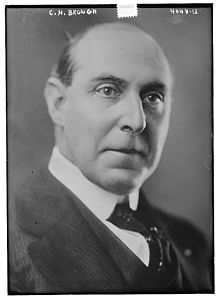Charles Hillman Brough
Charles Hillman Brough (born July 9, 1876 in Clinton , Mississippi , † December 26, 1935 in Washington, DC ) was an American politician and governor of the state of Arkansas between 1917 and 1921 .
Early years
Charles Brough spent the first few years of his life in the Utah Territory , where his parents had moved. After his mother's death in 1885, he returned to his native Clinton, where he grew up with an uncle. Until 1894 he attended Mississippi College . After spending a year with his father in Utah , he continued his studies. In 1898 he graduated from Johns Hopkins University . With a subsequent law degree at the University of Mississippi , Brough completed his education. He then began a successful career as a teacher. He has taught European history, economics, ethics, German and philosophy at well-known educational institutions such as the University of Arkansas and Mississippi College.
Arkansas Governor
Brough was a member of the Democratic Party and was elected as its candidate for the new governor of Arkansas in 1916 . He took office on January 10, 1917 and, after being re-elected in 1918, was able to rule for a total of four years. He promoted the education system by increasing the financial means for it; In addition, compulsory schooling was introduced, but this was ignored by some counties, and a girls' industrial school was built. A commission against illiteracy has also been set up. Women were given the right to vote in the primary elections; Arkansas was the only southern state that introduced women's suffrage, at least in part, before the official US Constitutional Amendment of 1919. A reformatory for women was also set up in Arkansas.
The governor was strictly against the then widespread lynching and put corresponding laws into force. He also took care of juvenile justice, health policy and social affairs. Brough was also a proponent of alcohol prohibition and welcomed the 18th Amendment to the US Constitution in 1919, which introduced it nationwide. On the other hand, Brough was also a racist who, like many other politicians in the South, viewed the Afro-American as an inferior race. When black farmers protested in 1919, he set up the National Guard . Some African Americans died in the related race riots. Regardless of these domestic political events, Broughs' tenure fell during the First World War , in which the United States had participated since April 1917. Brough supported the policies of President Woodrow Wilson up to and including his League of Nations plans , which was a rarity among American governors at the time. He made sure that soldiers were recruited in Arkansas and that production was converted to armaments for the time of the war.
Another résumé
After the end of his tenure as governor, Brough was head of the public relations bureau between 1925 and 1928. In 1929 he became president of Central Baptist College , Conway and between 1934 and 1935 he chaired a commission to regulate border affairs between the state of Virginia and the District of Columbia .
literature
- Foy Lisenby: Charles Hillman Brough. University of Arkansas, Fayetteville 1996, ISBN 978-1-55728-411-2 .
Web links
- Charles Brough in the National Governors Association
- Arkansas Governors
- Biography in the Arkansas Encyclopedia
- Charles Hillman Brough in the database of Find a Grave (English)
| personal data | |
|---|---|
| SURNAME | Brough, Charles Hillman |
| BRIEF DESCRIPTION | American politician |
| DATE OF BIRTH | July 9, 1876 |
| PLACE OF BIRTH | Clinton , Mississippi |
| DATE OF DEATH | December 26, 1935 |
| Place of death | Washington, DC |

